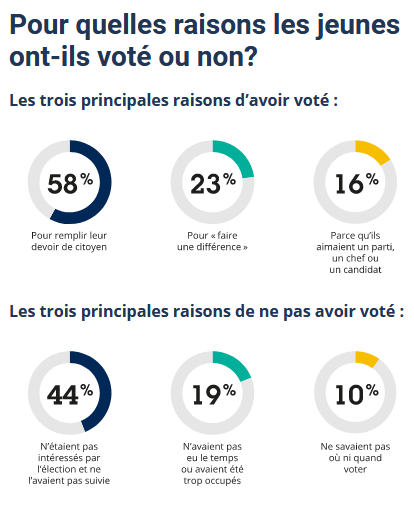Release date: February 24, 2022
The Institut de la statistique du Québec has been following a cohort of children born in Québec in 1997-1998 as part of the Québec Longitudinal Study of Child Development (QLSCD 1). Following this cohort over several years has allowed us to better understand the factors that can influence the development and well-being of children and youth, as well as their civic engagement.
In the winter and spring of 2019, the young participants in QLSDC 1, then aged 21, were asked about their political participation, including whether or not they had voted in the October 2018 provincial election. For almost all of them, this was the first election in which they could vote.
The publication Une analyse longitudinale des facteurs associés à la participation électorale des jeunes nés au Québec (PDF, 1.48 MB) examines the factors associated with the electoral participation of young adults born in Québec in the late 1990s. It focuses on the following questions:
- Is there an association between the level of civic engagement and the likelihood of having voted in the 2018 provincial election?
- Which factors measured in childhood, adolescence and adulthood are associated with young adults voting in the 2018 provincial election?
Civic engagement and electoral participation
The proportion of young adults who exercised their right to vote was higher among those who participated in three or more civic engagement activities than among those who participated in fewer or no activities.
The term civic engagement includes activities that young adults did in the 12 months prior to the survey, such as volunteering, being a member of an association or committee, raising money for a cause or organization, signing a petition, sharing their opinions about a political issue on a website, participating in a demonstration or rally, being a member of an action group or political party, not buying a product to show their disagreement with how the product is made or with the policies of the company that markets it.
Proportion of young adults1 who voted in the 2018 provincial election according to the number of civic engagement activities they participated in at age 20, Québec
1. Born in Québec in 1997-1998.
Refer to the publication (PDF, 1.48 MB) for statistically different proportions.
Source: Institut de la statistique du Québec, Québec Longitudinal Study of Child Development, 1998-2019.
Factors associated with the likelihood of voting
When all factors are considered simultaneously, the following factors remain associated with young adults voting:
Factors prior to adulthood
- Having a mother who has more than a high school diploma.
Factors in adulthood
- Having worked in the month prior to the survey.
- Having post-secondary education.
- Living in the Montréal census metropolitan area (CMA).
- Having trust in others.
- Having participated in civic engagement activities.
For the full results of this study, see the publication Une analyse longitudinale des facteurs associés à la participation électorale des jeunes nés au Québec (PDF, 1.48 MB).


